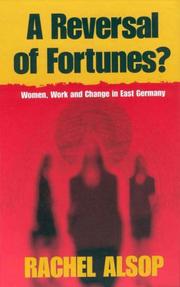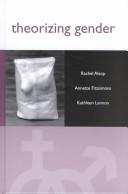| Listing 1 - 5 of 5 |
Sort by
|

ISBN: 1571817719 1571819657 1785330039 Year: 2000 Publisher: New York ; Oxford, [England] : Berghahn Books,
Abstract | Keywords | Export | Availability | Bookmark
 Loading...
Loading...Choose an application
- Reference Manager
- EndNote
- RefWorks (Direct export to RefWorks)
German unification brought fundamental, often traumatic changes for the people in eastern Germany. Women as a group were arguably more deeply affected by the changes than any other, and in one area in particular: that of work, which had far-reaching effects on them and their families' economic situation. Rachel Alsop critically examines the processes behind women's changing relationship to the labor market in eastern Germany following the collapse of state socialism and the transition to a market economy. By the 1980s women made up virtually half of the East German work force. The collapse of the GDR transformed the field of work, drastically diminishing the general demand for labor. Yet while economic and political restructuring reduced the volume of both male and female employment, it was women who bore the brunt of unemployment. In the immediate transitional period a re-masculinization of the workforce was evident, with women constituting the large part of the unemployed. Using an extensive range of both quantitative and qualitative data, the author explores the gender dynamics of the social, economic, and political restructuring of eastern Germany, thereby producing an important new context in which to examine contemporary debates on gender and work.
Women --- Sex discrimination in employment --- Sex role --- Employment --- Gender role --- Sex (Psychology) --- Sex differences (Psychology) --- Social role --- Gender expression --- Sexism --- Employment (Economic theory) --- Sex role in the work environment --- Sexual division of labor --- Gender roles --- Gendered role --- Gendered roles --- Role, Gender --- Role, Gendered --- Role, Sex --- Roles, Gender --- Roles, Gendered --- Roles, Sex --- Sex roles
Book
ISBN: 9781785330032 Year: 2000 Publisher: New York Oxford
Abstract | Keywords | Export | Availability | Bookmark
 Loading...
Loading...Choose an application
- Reference Manager
- EndNote
- RefWorks (Direct export to RefWorks)
Book
ISBN: 9780745683010 9780745683027 0745683053 0745683010 0745683029 Year: 2020 Publisher: Cambridge Polity
Abstract | Keywords | Export | Availability | Bookmark
 Loading...
Loading...Choose an application
- Reference Manager
- EndNote
- RefWorks (Direct export to RefWorks)
Theorizing gender is more urgent and highly political than ever before. These are times, in many countries, of increased visibility of women in public life and high-profile campaigns against sexual violence and harassment. Challenges to fixed, traditional gender norms have paved the way for the recognition of gay marriage and gender recognition acts allowing people to change the gender assigned to them at birth. Yet these are also times of religious and political backlash by the alt right, the demonization of the very term 'gender' and a renewed embrace of the 'naturalness' of gendered difference as ordained by God or Science.A follow-up to the authors' 2002 text, Theorizing Gender, this timely and necessary intervention revisits gender theory for contemporary times. Refusing a singular 'truth about gender', the authors explore the multiple strands which go into making our gendered identities, in the context of materialist and intersectional perspectives interwoven with phenomenological and performative ones. The resulting critical overview will be a welcome and invaluable guide for students and scholars of gender across the social sciences and humanities.
Gender identity --- Queer theory --- Sex (Psychology) --- Sociology of the family. Sociology of sexuality --- Gender identity. --- Queer theory.

ISBN: 0745619436 0745619444 Year: 2002 Publisher: Malden : Blackwell,
Abstract | Keywords | Export | Availability | Bookmark
 Loading...
Loading...Choose an application
- Reference Manager
- EndNote
- RefWorks (Direct export to RefWorks)
Sex role. --- Psychoanalyse --- psychoanalytische theorie --- psychoanalytische theorie. --- Psychoanalytische theorie.
Book

ISBN: 9780748683437 9780748683444 0748683445 9780748683451 0748683453 0748683437 1784023213 1322980748 Year: 2022 Publisher: Edinburgh
Abstract | Keywords | Export | Availability | Bookmark
 Loading...
Loading...Choose an application
- Reference Manager
- EndNote
- RefWorks (Direct export to RefWorks)
Introduces readers to a wide range of research methods for use in English StudiesGBS_insertPreviewButtonPopup(['ISBN:9780748683437','ISBN:9780748683444']);With a revised Introduction and with all chapters revised to bring them completely up-to date, this new edition remains the leading guide to research methods for final-year undergraduates, postgraduates taking Masters degrees and PhDs students of 19th- and 20th-century Literary Studies.Written by a range of distinguished contributors, each chapter centres on one particular method, offering both concrete practical advice on how to utilise it and exploring some of the methodological issues that are involved in the use of the particular method. The chapters cover research methods familiar to English scholars such as textual analysis, as well as those less commonly explored such as visual and quantitative methods, which also contribute significantly to research in English Studies. Other approaches discussed include auto/biographical methods, discourse analysis, interviewing, archival methods, ethnographic methods, oral history, creative writing as a research method, and research using information and communication technologies (ICTS).Key FeaturesOpens students minds to alternative research methodsIntroduces the research methodological vocabulary essential for describing methods used in a thesis and submitting good funding applicationsIntroduces debates surrounding the methods, encouraging professional development and engagement with the overall research context in nineteenth- and twentieth-century English StudiesOffers concrete examples of how methods might be used in English research"
English literature --- Research --- Methodology. --- Literature --- Belles-lettres --- Western literature (Western countries) --- World literature --- Philology --- Authors --- Authorship --- British literature --- Inklings (Group of writers) --- Nonsense Club (Group of writers) --- Order of the Fancy (Group of writers) --- Methodology
| Listing 1 - 5 of 5 |
Sort by
|

 Search
Search Feedback
Feedback About UniCat
About UniCat  Help
Help News
News